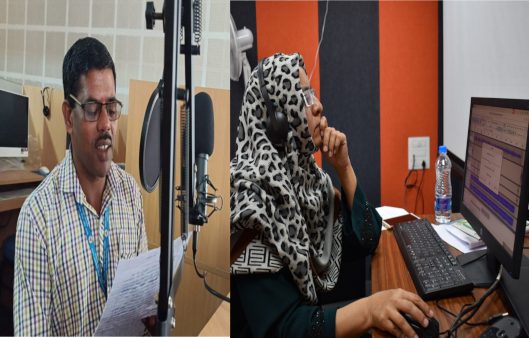Language learning is foundational to all learning and knowledge of concepts in the home language forms the basis of learning in other languages. Traditional pedagogies of language teaching focus predominantly on reading and writing and do not provide adequate and authentic immersion in the language which is necessary for effective language acquisition. Lack of such immersion may hinder the language learning process by making it an alienating process. Therefore, in addition to textbooks and other curricular material in the regional languages of instruction, having alternate resources and ways to engage with the language are necessary to supplement students’ language learning experiences.
IT for Change in 2023-24 piloted the program ‘Integrating Digital Story-Based Pedagogy in Language Education’ in collaboration with the Department of State Educational Research and Training (DSERT), Karnataka which is the apex government body in the state responsible for developing state-specific curriculum frameworks, textbooks, conducting research, and providing academic support to teachers and schools to improve the quality of primary and secondary education. The key objective of the program is to leverage the power of storytelling as a pedagogical tool along with newer possibilities that the digital medium offers to enrich students’ language learning experiences. Storytelling can transcend language barriers and engage students meaningfully. It stimulates students' imagination and enhances their listening and comprehension skills. Through listening to stories, students are exposed to language use in real-world situations, various sentence structures, and vocabulary in context. Incorporating storytelling as a pedagogical tool can provide opportunities for students to practice and develop language skills in a meaningful and enjoyable manner. Furthermore, storytelling allows teachers to bring cultural diversity into the classroom and create a shared understanding among students. With relevant and contextual story-based resources, pedagogy, and technology integration as the foundation, this program has been designed to aid the process of language teaching-learning and as a result, students’ educational outcomes.
The program focuses on teachers’ professional development (TPD) and aims to equip elementary school language teachers with the necessary technology know-how for creating story-based digital resources, strengthen their abilities to effectively utilize digital resources for language teaching-learning through inclusive and innovative pedagogies, help teachers experience and internalize meaningful technology integration and set up teachers Communities of Practice (CoPs) that can promote peer learning and mentoring by providing opportunities for them to share experiences and ideas. The objectives of this program are in line with those of the departments’ own initiatives such as the setting up of Sri. Alur Venkata Rao Language Skill Training Centers (AVR Bhasha Labs) across the state to introduce innovative language teaching methodologies in Primary and Secondary schools and promote language development in English, Kannada, and other regional languages. These centers were set up in 2019-20 in four government Colleges of Teacher Education (CTEs) – one in each of the 4 academic divisions of Karnataka – Bengaluru (Chitraduga), Mysuru, Belagavi and Gulbarga.
During 2023-24, the focus laid primarily on building capacities of teachers to create audio resources. As part of this process, two sets of workshops were conducted in the four CTEs with select cohorts of teachers. The first set of workshops focused on story narration and recording and the second set of workshops focused on editing the recorded stories using a Free and Open Source (FOSS) tool, Audacity, to enhance it with music and sound effects. Over 200 high-quality audio stories have been produced in Kannada, English, Urdu and Marathi languages which will be made available as Open Educational Resources (OER) on a repository to teachers across the state.
Teachers shared positive feedback appreciating the learning opportunities that the workshop provided in terms of immersively experiencing storytelling, understanding the audio production process and hands-on exposure to FOSS tools for audio editing. Teachers also shared that they saw value in the resources produced as they could imagine the possibility of taking them to their classrooms and the impact they can have on children’s langugage learning.
The next phase of the program will focus on the ways in which the audio stories can be used as part of the classroom teaching-learning process to support children’s language development. Through exemplar activities, demonstrations, group discussions and hands-on exposure, the workshops will help teachers comprehend and experience digital story-based pedagogy. The program is also proposed to be scaled up to more districts of Karnataka through collaboration with District Institutes of Education and Training (DIETs), along with the CTEs.

